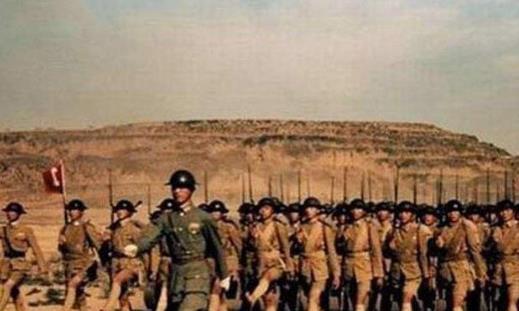The National Revolutionary Army led by Chiang Kai-shek, after winning the victory in the Eastern Crusade, began to plan the Northern Expedition and engage in a great decisive battle with the Beiyang warlords at that time. After everything was ready, Chiang Kai-shek served as the commander-in-chief of the Northern Expeditionary Army and swore an oath to the Northern Expedition in Guangzhou. The strategic plan of the Northern Expedition was to first attack Wu Peifu, then Sun Chuanfang, and finally to clean up Zhang Zuolin, who was stronger.
At the beginning of the Northern Expedition, the National Revolutionary Army led by Chiang Kai-shek was greatly boosted in morale, and all the way north it achieved a series of victories, repelling warlord forces such as Wu Peifu and Sun Chuanfang, and occupying Zhejiang, Shanghai, Hubei and other places. It can be said that at this time, the southeastern half of the country was occupied by the National Revolutionary Army.
Although they repelled the Beiyang warlords and achieved a stage victory, the forces in the hands of Sun Chuanfang, Zhang Zongchang and others were still very strong, and did not seriously damage the foundation of these warlord groups. As a result, Sun Chuanfang has been looking for opportunities to fight back and take back the territory he lost.

Later, Sun Chuanfang finally waited for this opportunity, and a disagreement arose within the National Revolutionary Army that occupied the southeastern half of the country. One part was headed by Chiang Kai-shek, and the other part was headed by Wang Jingwei, and two factions were formed into two factions, each establishing a different political regime, and history called this incident the separation of the Ning and Han dynasties.
Just when the National Revolutionary Army was unstable within, Sun Chuanfang gathered 60,000 elite troops and crossed the river to the south of the river to face shame. In the face of foreign enemies, the National Revolutionary Army once again achieved internal unification and continued to complete the Northern Expedition.
However, when all the Northern Expeditionary Forces were on schedule and achieved certain victories on the battlefield, Chiang Kai-shek was defeated by Sun Chuanfang's 60,000 elite army in Xuzhou, resulting in the loss of Xuzhou. This made Chiang Kai-shek very embarrassed, so the Gui generals Li Zongren, Bai Chongxi, and He Yingqin joined forces to use the fall of Xuzhou to make a fuss and make Chiang Kai-shek go into the wilderness.
Although Chiang Kai-shek went to the wilderness, the fact that Sun Chuanfang's army occupied Xuzhou could not be changed. Therefore, He Yingqin led the First Army, Li Zongren led the 7th Army of the Gui Clan, plus Bai Chongxi's three parties and Sun Chuanfang's army to meet Longtan, known in history as the Battle of Longtan.
It can be said that the victory or defeat of the Battle of Longtan has a great impact, because Sun Chuanfang is out of the nest this time, if he wins, he can also dominate the southeast for a period of time, if he loses, it is a disgrace. It is equally important to the National Revolutionary Army, which won and sat on the southeastern half of the country, and if it lost, it may have to return to the old nest of Guangzhou, and work hard for a few more years. However, Chiang Kai-shek, who was the leader of the Nationalist army in such an important battle, had no chance to witness this battle with his own eyes, let alone command. At that time, the main commanders of the National Revolutionary Army commanding the Battle of Longtan were He Yingqin, Li Zongren, and Bai Chongxi.
He Yingqin led the Whampoa Army and li Zongren's Guizhou Seventh Army was the main force in this battle, they fought bloodily in the Battle of Longtan, and in order to achieve success, the Great Cause of the Nationalist Government made great contributions. In particular, Bai Chongxi played a decisive role in this battle, and it was under his command that the National Revolutionary Army turned from inferior to superior. In the end, the three major armies met with Sun Chuanfang's army in the bloody battle of Longtan, and after a fierce battle, the National Revolutionary Army defeated Sun Chuanfang and won the victory in the Battle of Longtan.
The victory in this battle had a great impact on the National Revolutionary Army and also achieved the great cause of the National Government, and since then the southeastern half of the country has been in its hands. Mr. Yu Renlao, the elder of the Nationalist Army, once wrote a joint (to evaluate the degree of influence of the Longtan Campaign): There was no enemy left in the Southeast World War, and the party-state was heavily reworded for a thousand years. As the commander of this battle, Bai Chongxi also won the title of Xiao Zhuge Ge. Tan Yanmin also had a joint gift with Bai Chongxi: the conductor can return to heaven and earth, and the children who learn the language know their names.